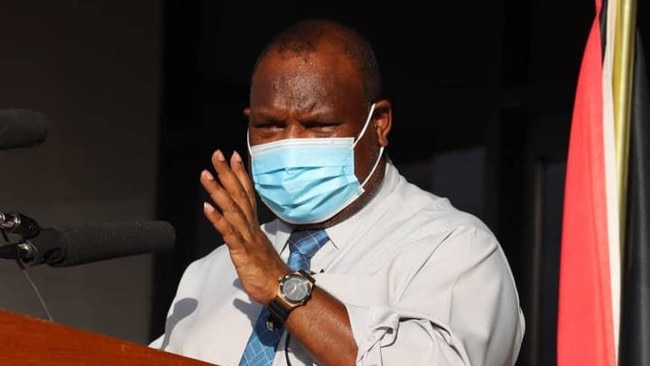Pandemic on our northern doorstep likely to get worse

Countries such as Tuvalu, Nauru, Tonga, Kiribati and Niue are among the few in the world with no cases of COVID. The same is true for the Cook Islands, Tokelau and the Federated States of Micronesia
These small countries have largely cut themselves off from the rest of the world. The only people coming in have been very carefully managed repatriation flights.
The Pacific can’t risk letting in COVID: most islands have limited medical facilities and very high rates of diabetes, heart disease and other non-communicable diseases that put their populations at risk if COVID spread in their small nations. Sadly, there’s evidence that there’s been an upsurge in COVID cases across Papua New Guinea.
Between February 22 and February 28, there were 260 new cases reported — one-third of the total number of cases reported in just one month since the pandemic began.
The number of cases isn’t declining and is averaging between 40 and 50 a day.
That’s with only half the 22 provinces reporting testing on a daily basis. It can be safely assumed the real case rate in much higher.
Indeed, PNG’s health department secretary has said that low testing rates have led to an underestimation of the extent of the virus in the country. He noted that about 40 temporary staff performing “critical functions” at the country’s national COVID control centre hadn’t been paid since starting work there five months ago.
Virus case numbers certainly haven’t increased because of increased testing: since February last year, just over 50,000 tests have been conducted in a population of between 8.5 and nine million.
A key factor in the increase has been the dysfunctional state of the PNG health system. Since PNG’s independence in 1975, the number of rural health centres has declined by as much as 50 per cent despite a rapidly growing population.
The state of the nation’s hospitals is generally poor and unable to meet the community’s demand. Church health services have been maintained but they can’t carry the burden for the majority of the country.
The state of the health system and the urgency of the escalating need and nationwide incidence of COVID means that Australia should now examine new ways of assisting PNG address the crisis.
It’s a daunting challenge: PNG has a population nearly double that of New Zealand.
We should be providing special funding to the churches, which generally operate the best health services in PNG. We need to provide greater financial support for Australian-based bodies such as Youth with a Mission, who deliver vital health services, with minimal Australian government funding.
We should provide urgent capacity building assistance to the PNG’s health system — doctors, nurses and other professionals trained in the management of COVID outbreaks. More testing capacity should be supported, but the real need is skilled and committed personnel who can deliver health services in a culturally appropriate manner.
China has offered to donate Papua New Guinea 100,000 vaccines. The PNG government has denied there’s any agreement with China over the provision of vaccines. In any event for a population of almost nine million that’s a miserable effort and will be seen as such in PNG.
Most countries in the region are depending on the WHO-led COVAX system to get them vaccines, but the UK-based Economist Intelligence Unit has forecast that some Pacific countries may not get to vaccinate the majority of their populations until at least 2025. The group said this involved more than 60 per cent of people in PNG, Fiji, Vanuatu and the Solomon Islands.
Australia has committed to providing $111m to PNG — in addition to ongoing aid commitments — for COVID vaccinations over the coming three years.
For once, China is on the back foot. Vaccinating a population that’s 80 per cent located in rural communities, many of them remote and coastal and island communities across the nation, will be a massive challenge.
We have an escalating pandemic on our northern border that’s likely to get worse before it gets better.
We should respond to the crisis by sending experienced doctors specialising in disease management. And we should also be working with like-minded countries with spare resources such as Taiwan, South Korea and Singapore to send doctors and nurses to mentor and develop capacity.
We should engage in new partnerships with the churches and groups like Rotary and PNG’s health sector to help our closest neighbour through a crisis that’s not going away.
Jeffrey Wall has had a four-decade association with PNG, including as an adviser to prime ministers and senior ministers. Anthony Bergin is a senior fellow at the Australian Strategic Policy Institute



The COVID pandemic has presented one of the greatest challenges to our Pacific island neighbours. To date, the islands have done well.